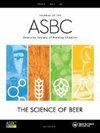Flavor Defects of Fresh and Aged NABLABs: New Challenges Against Oxidation
IF 1.8
4区 农林科学
Q4 BIOTECHNOLOGY & APPLIED MICROBIOLOGY
Journal of the American Society of Brewing Chemists
Pub Date : 2022-11-28
DOI:10.1080/03610470.2022.2142756
引用次数: 0
Abstract
Abstract At present, non-alcoholic (NAB) and low-alcoholic beers (LAB) exhibit major staling defects even when fresh, partly due to absence of ethanol as an antioxidant. In the present work, the aroma stability of eleven commercial NABLABs available on the Belgian market, issued from different technological processes, was assessed. NABLABs were investigated, both when fresh and after one year of storage at 20 °C in the dark. Six stale-odorant compounds were found above their perception threshold in aged NABLABs: sotolon, abhexon, methional, phenylacetaldehyde, dimethyltrisulfide and β-damascenone. Based on the chemical structure of the first four, it can be concluded that oxidation is the main issue for NABLABs aging. Yet, five of these usual staling defects of a six-month lager beer were already key-odorants in fresh NABLABs: dimethyltrisulfide, methional, and β-damascenone were above the thresholds in all samples, phenylacetaldehyde in 10 out of 11, and sotolon in 7. In conclusion, development of efficient antioxidants is needed to improve NABLABs acceptability.新鲜和老化NABLABs的风味缺陷:抗氧化的新挑战
目前,无酒精啤酒(NAB)和低酒精啤酒(LAB)即使在新鲜时也会出现严重的变质缺陷,部分原因是由于缺乏乙醇作为抗氧化剂。在本工作中,对比利时市场上11种不同工艺生产的商用NABLABs的香气稳定性进行了评估。NABLABs在新鲜和在20°C黑暗中保存一年后进行了研究。在老年NABLABs中发现了6种高于感知阈值的恶臭化合物:sotolon、abhexon、methional、phenylacedehyde、dimethyltrisulfide和β-damascenone。根据前四种化合物的化学结构,可以得出氧化是NABLABs老化的主要问题。然而,六个月窖藏啤酒的这些常见的变质缺陷中,有五种在新鲜的NABLABs中已经是关键气味:二甲基三硫化物、甲基硫醚和β-达马酮在所有样本中都超过了阈值,苯乙醛在11个样本中有10个,索托龙在7个样本中超过了阈值。总之,需要开发高效抗氧化剂来提高NABLABs的可接受性。
本文章由计算机程序翻译,如有差异,请以英文原文为准。
求助全文
约1分钟内获得全文
求助全文
来源期刊

Journal of the American Society of Brewing Chemists
工程技术-生物工程与应用微生物
CiteScore
4.00
自引率
20.00%
发文量
41
审稿时长
3 months
期刊介绍:
The Journal of the American Society of Brewing Chemists publishes scientific papers, review articles, and technical reports pertaining to the chemistry, microbiology, and technology of brewing and distilling, as well as the analytical techniques used in the malting, brewing, and distilling industries.
 求助内容:
求助内容: 应助结果提醒方式:
应助结果提醒方式:


